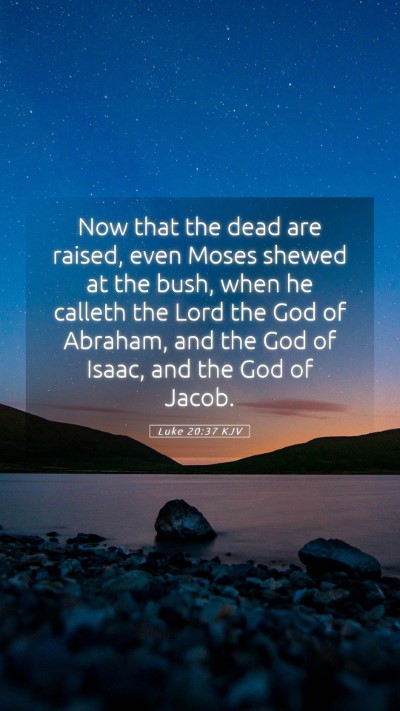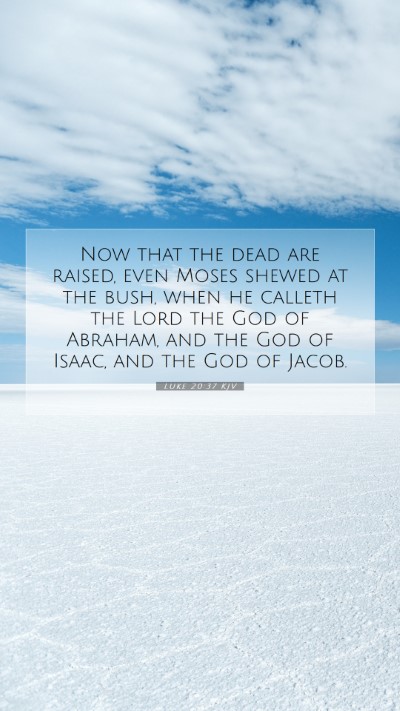Bible Verse Meaning and Commentary: Luke 20:37
Verse Reference: Luke 20:37 - "But that the dead are raised, even Moses showed at the bush when he called the Lord the God of Abraham, and the God of Isaac, and the God of Jacob." (KJV)
Overview of Luke 20:37
This verse occurs during a critical discourse where Jesus confronts the Sadducees, a sect that denied the resurrection. In this teaching, Jesus references the encounter Moses had with God at the burning bush, emphasizing the reality of the resurrection of the dead based on God's own declarations about His relationship with the patriarchs.
Commentary Insights
Insights from Matthew Henry
Matthew Henry emphasizes that Jesus presents a strong argument for the resurrection by invoking Moses, which is foundational to Jewish faith. He points out that God’s declaration, “I am the God of Abraham, Isaac, and Jacob,” indicates that these patriarchs continue to exist in some form, thus affirming their resurrection. This resonates with the idea that since God is a God of the living, His promises and covenants extend beyond physical death.
Thoughts from Albert Barnes
Albert Barnes notes that Jesus uses this reference strategically to demonstrate that the very law the Sadducees hold dear supports the resurrection. He explains that if Abraham, Isaac, and Jacob are present in God’s eyes, then they must be alive in a spiritual sense, supporting the belief in resurrection. Barnes also highlights how this reinforces the continuity of life beyond death, ensuring believers that their existence does not cease at mortality.
Reflections by Adam Clarke
Adam Clarke's commentary elaborates on the significance of God’s self-identification as the God of the patriarchs. He stresses that God’s eternal nature implies the continual existence of those whom He calls His own. Clarke connects this concept with the broader themes of hope and eternal life found throughout Scripture, emphasizing that this truth offers assurance and encouragement to believers about their eternal future.
Theological Implications
From these interpretations, several theological implications arise:
- The Nature of God: The character of God is that of life and continuity; He is the God of the living.
- Hope of Resurrection: Believers can rest in the hope of eternal life as assured through God’s promises to the patriarchs.
- Scriptural Authority: This verse highlights the importance of Scriptural references and their use in theological disputes.
Practical Applications
This verse invites believers to ponder the implications of resurrection not just in a future context but in how they live today:
- Affirming Faith: Christians can draw strength from the assurance that death is not the end.
- Living in Hope: Believers should cultivate attitudes of hope and purpose, reflecting the belief in eternal life.
- Biblical Engagement: Engage deeply with Scriptures, seeking to understand them within their historical context and theological significance.
Cross References
Several other Scriptures complement the understanding of Luke 20:37:
- Exodus 3:6 - God's declaration to Moses at the burning bush.
- Matthew 22:31-32 - Jesus speaks further about the resurrection.
- Hebrews 11:16 - Acknowledgment of the heavenly country for which believers strive.
Conclusion
In conclusion, Luke 20:37 serves as a powerful reminder of the resurrection's reality, framed within a robust argument by Jesus. This passage encourages believers to engage with Scripture deeply and live in the light of the hope of eternal life. Whether through Bible study groups or personal reflection, the insights from public domain commentaries enrich our understanding of this pivotal doctrine in Christian faith.
Further Study
For those interested in a more in-depth exploration of the topics mentioned, consider resources on:
- Understanding difficult Bible passages.
- Applying Bible verses to daily life.
- Historical context of the resurrection in Jewish thought.


